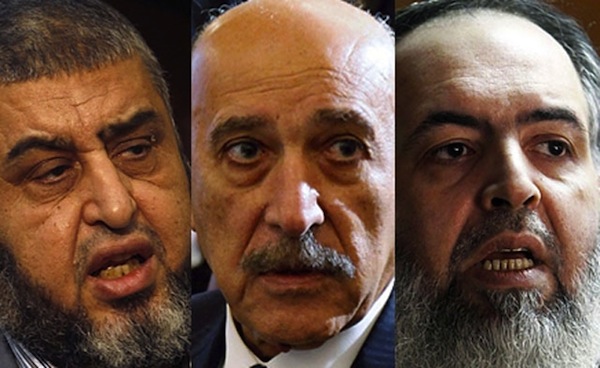
Disqualified candidates: Khairat al-Shater, Omar Suleiman, and Hazem Abu Ismail. Source: Google Images
Just as the blogosphere was starting to become familiar with the likely frontrunners in Egypt’s upcoming presidential race, the election commission disqualified three of the most most visible candidates, upholding this decision on Tuesday. The commission deemed candidates ineligible for various reasons: Salafist preacher Hazem Abu Ismail’s mother was an American citizen, Muslim Brotherhood financier Khairat al-Shater had a prior criminal conviction, and Mubarak’s spy chief Omar Suleiman narrowly fell short of collecting the number of signatures required for a presidential run. While some observers argue that the disqualifications were politically motivated or the handiwork of the military, others praised the electoral commission’s adherence to the law and the apparent evenhandedness of its decisions.
Presidential eligibility laws across electoral systems represent both an opportunity for governments to ensure fair contests and for various groups to push their own interests. The world’s oldest democracies are no exception to these dynamics. For several weeks last year, the Donald Trump-led “birther” movement dominated the national conversation in the U.S. with malicious and utterly baseless allegations about President Obama’s birth certificate and eligibility for the presidency. More than one hundred years earlier, President Chester A. Arthur’s rivals argued that he was born in Canada, and Arthur became the target of an 1884 book, How a Subject of the British Empire Became President of the United States. (Arthur’s true birthplace remains uncertain to this day). Over the next few weeks in Egypt, it is likely that presidential candidates will continue to face credible as well as opportunistic challenges to their eligibility.
Of course, political opportunism can also play a defining role in the drafting of presidential eligibility laws in the first place. In Egypt, this reality has manifested itself in a rather ironic way for some of the candidates. The New York Times reports that
the disqualifications underscore the unintended consequences of Egypt’s byzantine electoral rules. Mr. Suleiman, a stalwart of the Mubarak government, was tripped up by cumbersome rules it put in place to discourage challenges to Mr. Mubarak. Mr. Abu Ismail, on the other hand, was stymied by rules his fellow conservatives added to keep out liberals suspected of ties to the West.
As Egypt’s elections move forward, the Egyptian leadership must make the potentially landmark decision of whether to ban senior members of the Mubarak regime from running for political office for the next ten years. The Egyptian parliament voted in favor of the ban last week, and the ban was among the demands of thousands of protestors in Tahrir Square on Friday. Egypt would not be the first Arab Spring country to pass such a law: both Tunisia and Libya have already implemented similar bans, with Libya also barring “academics who wrote about Gaddafi’s ‘Green Book’ from the upcoming elections.” The decision on the ban ultimately lies with the Supreme Constitutional Court, which should announce its ruling within the next two weeks.
Whether to incorporate members of former regimes into new governments is one of the most important initial questions for an emerging democracy—something that the citizens of Eastern European countries know well. After the fall of the Berlin Wall, many countries across Eastern Europe enacted policies of lustration, barring individuals who worked for the communist regime and/or the secret police from public office and civil service positions. There are numerous reasons for a new government to pursue lustration, ranging from avoiding messy trials to promoting national healing to protecting a revolution’s gains. In many cases, the effects of lustration on a country’s politics are nothing if not long lasting: as a March 2011 Foreign Policy article on the lessons of lustration for the Arab Spring observed, the Archbishop of Warsaw resigned as late as 2007 after he was “outed as a [former Communist] informant.” Regardless of whether Egypt follows in the footsteps of Tunisia and Libya (and much of Eastern Europe) on this particular presidential eligibility law, the question of how the new government and other public institutions should incorporate or exclude erstwhile members of the Mubarak regime is unlikely to go away any time soon.